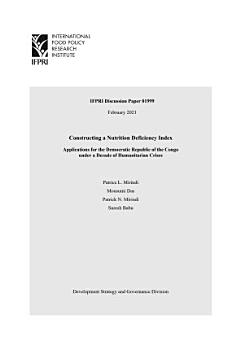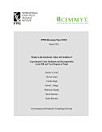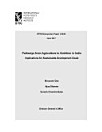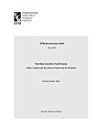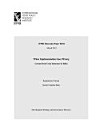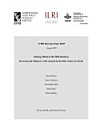Constructing a nutrition deficiency index: Applications for the Democratic Republic of the Congo under a decade of humanitarian crises
Mirindi, Patrice L. · Das, Mousumi · Mirindi, Patrick N. · Babu, Suresh Chandra
feb. de 2021 · IFPRI Discussion Paper Libro 1 · Intl Food Policy Res Inst
Libro electrónico
50
Páxinas
family_home
Apto
info
reportAs valoracións e as recensións non están verificadas Máis información
Acerca deste libro electrónico
The Democratic Republic of the Congo (DRC) is perennially plagued by prolonged phases of poverty, conflict, and increased internal migration, as well as pandemic outbreaks such as Ebola and COVID-19, and limited livelihood opportunities. Such unexpected or catastrophic events have rendered households vulnerable and resulted in poor health outcomes. Given this background, we intend to analyze the nutritional profile of households for a period spanning almost a decade using the Household Consumption Expenditure Survey (HCES). We construct a composite nutrition deficiency index (NDI), capturing intake of 14 different macro- and micronutrients (which we refer to as dimensions)—namely, calories, protein, calcium, zinc, folate, thiamine, niacin, iron, vitamin A, vitamin B12, vitamin D, vitamin B6, vitamin C, and vitamin E—using the popular Alkire-Foster methodology. This methodology, usually used to construct multidimensional poverty indexes, in this case helps measure the incidence, intensity, and combined extent of multinutrient deprivation. DRC’s values on the multidimensional NDI vary regionally from 0.13 to 0.73. Urban DRC performs worse than rural DRC. Regions subject to the conflict and Ebola crises are the worst-affected of the nutritionally deprived regions. Deficiency in calorie and protein intake contributes to the highest values of the NDI, but we also find evidence of a double burden of malnutrition, with households lacking consumption of both macro- and micronutrients. South Kivu is the worst-performing of all regions and Mongala the best. The northern parts of DRC have fewer nutritionally deprived households, as compared with the central and southwestern parts. Our main policy recommendation is to help improve market access in urban areas so that people consume a more diverse diet. In rural areas, the government should support improving nutrition-sensitive agricultural production. Although the World Food Programme has a sustained presence in the country, uplifting households from severe hunger, active participation by the government and collaboration with multiple stakeholders is called for.
Valora este libro electrónico
Dános a túa opinión.
Información de lectura
Smartphones e tabletas
Instala a aplicación Google Play Libros para Android e iPad/iPhone. Sincronízase automaticamente coa túa conta e permíteche ler contido en liña ou sen conexión desde calquera lugar.
Portátiles e ordenadores de escritorio
Podes escoitar os audiolibros comprados en Google Play a través do navegador web do ordenador.
Lectores de libros electrónicos e outros dispositivos
Para ler contido en dispositivos de tinta electrónica, como os lectores de libros electrónicos Kobo, é necesario descargar un ficheiro e transferilo ao dispositivo. Sigue as instrucións detalladas do Centro de Axuda para transferir ficheiros a lectores electrónicos admitidos.
